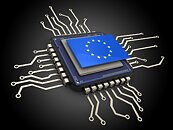Wednesday, December 30th 2020
EU Signs Declaration for 2 nm Node and Custom Processor Development
European Union has today processed a declaration that was signed by 17 member states about the development of a 2 nm semiconductor node and an advanced low-power processor. The declaration signed today proposes that the EU puts away 145 billion Euros for the development of the technologies needed to manufacture a 2 nm semiconductor manufacturing process, along with the development of a custom, low-power embedded processor designed for industrial applications. The 17 member countries include Belgium, France, Germany, Croatia, Estonia, Italy, Greece, Malta, Spain, The Netherlands, Portugal, Austria, Slovenia, Slovakia, Romania, Finland, and Cyprus. All of the countries listed are going to join the development of these technologies and will have the funds to do it over the next 2-3 years.
Source:
EETimes Europe
EU DeclarationTo ensure Europe's technology sovereignty and competitiveness, as well as our capacity to address key environmental and societal challenges and new emerging mass markets, we need to strengthen Europe's capacity to develop the next generation of processors and semiconductors. This includes chips and embedded systems that offer the best performance for specific applications across a wide range of sectors as well as leading-edge manufacturing progressively advancing towards 2 nm nodes for processor technology. Using connectivity, where Europe enjoys global lead, as a major use case driver for developing such capacity enables Europe to set the right level of ambition. This will require a collective effort to pool investment and to coordinate actions, by both public and private stakeholders.

29 Comments on EU Signs Declaration for 2 nm Node and Custom Processor Development
We will see.
Already Intel's Hedge fund managers are asking Intel to go fabless....Russia has 3 FAB's. 2 in Zelenograd (90nm and 65nm) and 1 in Kaliningrad (GS Nanotech that does upwards to 45nm so they say). They have very specific tasks/needs with Mikron's 65nm is specific to producing Elbrus 4SM and Elbrus 1 while also making RFID tech, and Angstrom's 90nm for Elbrus 2SM which is used for military applications as Elbrus 4SM is for government applications. GS Nanotech is for making SoC for top boxes and what not. The Market isn't big enough to warrant a 16nm plant to be honest as majority of the chips made are for government and Military. Cell phone sales are large but only at about 7m a year tops and opening a plant to produce modern 16nm or lower processors for mobile market, it will take a long time or never for that plant to pay off.
But many (Rostec and AFK Sistema) have been trying to get Ministry of Industry and trade to invest in 28nm or less facility for a few years now. But the ministry is stating that the market demand isn't high enough to warrant such a large investment.
Country's within the EU are better off without the EU as a whole.
It's like giving money to a company for free, nice.
Inject that much money will only make rich people richer, and poor people even more poor than before.
Seems to be heavy on German companies and very, very light on Dutch companies.
Europe's big and with a bit of luck we're pushing the truly corrupt states out of the equation. Two of them are currently on a good path to helping themselves out in that sense and one's already gone, after many decades of stalling. What's left will probably still be corrupt, though :) But you can't catch wolves with sheep.No need I think. What we need is the actual fab capacity, not the machinery inside it. And that requires manpower most of all. The technology isn't the issue, the braindrain is. For decades now big tech has been growing in the US, in Asia... but not in Europe. All we thought about was how to start swinging the banhammer at all the things that have evolved in directions we don't like, so we come with stuff like GDPR.
I really hope this agreement is a stepping stone to a broad movement that lasts, and isn't just another engine for the German economy, because it does seem a lot of the recent stuff is directed that way.5 - 3 = 2, the math checks out!
It's like Europe is giving money to farmers to produce more, and then get ripped off by huge groups like Lactalis